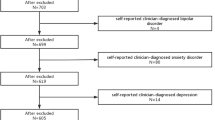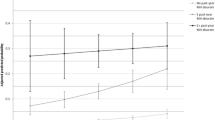Abstract
Background
Although poor sleep quality is the most common subjective complaint of workers and is a risk factor for depressive symptoms and suicide, researchers have not yet provided definitive links between insomnia symptoms, depressive symptoms, and suicide.
Purpose
In our mediation model, we hypothesized relationships among insomnia symptoms, depressive symptoms, and suicide ideation. The purpose here was to use structural equation modeling (SEM) to test our mediation model.
Method
Three hundred forty-three Japanese full-time white-collar workers completed the measures to assess insomnia symptoms, depressive symptoms, and suicide ideation over an approximately 3-month period.
Results
A SEM analysis revealed that insomnia symptoms were positively and significantly associated with depressive symptoms, and depressive symptoms were positively and significantly associated with suicide ideation. Two tests showed a significant indirect effect of insomnia symptoms on suicide ideation through depressive symptoms. Thus, these results supported our mediation model.
Conclusion
We conclude that insomnia symptoms were positively associated with suicidal ideation, though this relation was accounted for by depressive symptoms in Japanese white-collar workers.


Similar content being viewed by others
Notes
Multiple regression analysis was conducted with insomnia symptoms and depressive symptoms as the predictors of suicide ideation. The β weight for the insomnia symptoms score was negative (β = −0.178, p < 0.001), although the correlation coefficient between insomnia symptoms score and suicide ideation score was positive. Multicollinearity diagnostic statistics were 0.699 for tolerance and 1.430 for variance inflation factor (VIF), which were within the acceptable ranges (tolerance >0.10 and VIF <10) [42].
References
Doi Y, Minowa M, Tango T. Impact and correlates of poor sleep quality in Japanese white-collar employees. Sleep. 2003;26:467–71.
Kudielka BM, von Kanel R, Gander ML, Fischer JE. Effort-reward imbalance, overcommitment and sleep in a working population. Work Stress. 2004;18:167–78.
Hawton K, van Heeringen K. Suicide. Lancet. 2009;373:1372–81.
Vital, Health and Social Statistics Division in the Ministry of Health, Labour and Welfare. Outline of vital Statistics in Japan. 2013. http://www.mhlw.go.jp/toukei/saikin/hw/jinkou/geppo/nengai12/dl/gaikyou24.pdf. Accessed 9 June 2013.
Baglioni C, Battagliese G, Feige B, Spiegelhalder K, Nissen C, Voderholzer U, et al. Insomnia as a predictor of depression: a meta-analytic evaluation of longitudinal epidemiological studies. J Affect Disord. 2011;135:10–9.
Liu X, Buysse DJ. Sleep and youth suicidal behavior: a neglected field. Curr Opin Psychiatr. 2005;19:288–93.
McCall WV, Blocker JN, D’Agostino Jr R, Kimball J, Boggs N, Lasater B, et al. Insomnia severity is an indicator of suicidal ideation during a depression clinical trial. Sleep Med. 2010;11:822–7.
Pigeon WR, Caine ED. Insomnia and the risk for suicide: does sleep medicine have interventions that can make a difference? Sleep Med. 2010;11:816–7.
Fujino Y, Mizoue T, Tokui N, Yoshimura T. Prospective cohort study of stress, life satisfaction, self-rated health, insomnia, and suicide death in Japan. Suicide Life Threat Behav. 2005;35:227–37.
Goodwin RD, Marusic A. Association between short sleep and suicidal ideation and suicide attempt among adults in the general population. Sleep. 2005;31:1097–101.
Krakow B, Ribeiro JD, Ulibarri VA, Krakow J, Joiner Jr TE. Sleep disturbances and suicidal ideation in sleep medical center patients. J Affect Disord. 2011;131:422–7.
Wojnar M, Ilgen MA, Wojnar J, McCammon RJ, Valenstein M, Brower KJ. Sleep problems and suicidality in the National Comorbidity Survey Replication. J Psychiatr Res. 2009;43:526–31.
Bjørngaard JH, Bjerkeset O, Romundstad P, Gunnell D. Sleeping problems and suicide in 75,000 Norwegian adults: a 20 year follow-up of the HUNT I study. Sleep. 2011;34:1155–9.
Bernert RA, Joiner Jr TE, Cukrowicz KC, Schmidt NB, Krakow B. Suicidality and sleep disturbances. Sleep. 2005;28:1135–41.
Nadorff MR, Nazem S, Fiske A. Insomnia symptoms, nightmares, and suicidal ideation in a college student sample. Sleep. 2010;34:93–8.
Cole MG, Dendukuri N. Risk factors for depression among elderly community subjects: a systematic review and meta-analysis. Am J Psychiatry. 2003;160:1147–56.
Franzen PL, Buysse DJ. Sleep disturbances and depression: risk relationships for subsequent depression and therapeutic implications. Dialogues Clin Neurosci. 2008;10:473–81.
Ohayon MM. Epidemiology of insomnia: what we know and what we still need to learn. Sleep Med Rev. 2002;6:97–111.
Riemann D, Voderholzer U. Primary insomnia: a risk factor to develop depression? J Affect Disord. 2003;76:255–9.
Staner L. Comorbidity of insomnia and depression. Sleep Med Rev. 2010;14:35–46.
Yokoyama E, Kaneita Y, Saito Y, Uchiyama M, Matsuzaki Y, Tamaki T, et al. Association between depression and insomnia subtypes: a longitudinal study on the elderly in Japan. Sleep. 2010;33:1693–702.
Roberts RE, Duong HT. Depression and insomnia among adolescents: a prospective perspective. J Affect Disord. 2013;148:66–71.
Jaussent I, Bouyer J, Ancelin M, Akbaraly T, Peres K, Ritchie K, et al. Insomnia and daytime sleepiness are risk factors for depressive symptoms in the elderly. Sleep. 2011;34:1103–10.
Terzano MG, Parrino L, Cirignotta F, Ferini-Strambi L, Gigli G, Rudelli G, et al. Studio Morfeo: insomnia in primary care, a survey conducted on the Italian population. Sleep Med. 2004;5:67–75.
Nock MK, Hwang I, Sampson NA, Kessler RC. Mental disorders, comorbidity and suicidal behavior: results from the National Comorbidity Survey Replication. Mol Psychiatry. 2010;15:868–76.
Hall R, Platt D, Hall R. Suicide risk assessment: a review of risk factors for suicide in 100 patients who made severe suicide attempts. Psychosomatics. 1999;40:18–27.
Keith H, Carolina CIC, Camilla H, Kate S. Risk factors for suicide in individuals with depression: a systematic review. J Affect Disord. 2013;147:17–28.
Mann JJ, Apter A, Bertolote J, Beautrais A, Currier D, Haas A, et al. Suicide prevention strategies: a systematic review. JAMA. 2005;294:2064–74.
Roth KB, Borges G, Medina-Mora M, Orozco R, Ouéda C, Wilcox HC. Depressed mood and antisocial behavior problems as correlates for suicide-related behaviors in Mexico. J Psychiatr Res. 2011;45:598–602.
Turvey CL, Conwell Y, Jones MP, Phillips C, Simonsick E, Pearson JL, et al. Risk factors for late-life suicide: a prospective, community-based study. Am J Geriatr Psychiatry. 2002;10:398–406.
Desseilles M, Perroud N, Guillaume S, Jaussent I, Genty C, Malafosse A, et al. Is it valid to measure suicidal ideation by depression rating scales? J Affect Disord. 2012;136:398–404.
Kato T. Development of the Sleep Quality Questionnaire in healthy adults. J Health Psychol. 2013. doi:10.1177/1359105313482168.
National Institutes of Health. Insomnia: assessment and management in primary care. National Institutes of Health. 1998;22:S402–8. No.98-4088. 1998.
Radloff LS. The CES-D Scale: a self-report depression scale for research in the general population. Appl Psychol Meas. 1977;1:385–401.
Iwata N, Roberts CR, Kawakami N. Japan–U.S. comparison of responses to depression scale items among adult workers. Psychiatry Res. 1995;8:237–45.
Osman A, Bagge CL, Gutierrez PM, Konick BA, Kopper BA, Barrios FX. The Suicidal Behaviors Questionnaire-Revised (SBQ-R): validation with clinical and nonclinical samples. Assessment. 2001;8:443–54.
Baron RM, Kenny DA. The moderator-mediator variable distinction in social psychological research: conceptual, strategic, and statistical considerations. J Pers Soc Psychol. 1986;51:1173–82.
MacKinnon DP, Lockwood CM, Hoffman JM, West SG, Sheets V. A comparison of methods to test mediation and other intervening variable effects. Psychol Methods. 2002;7:83–104.
Freedman LS, Schatzkin A. Sample size for studying intermediate endpoints within intervention trials of observational studies. Am J Epidemiol. 1992;136:1148–59.
MacKinnon DP, Krull JL, Lockwood C. Evidence of the mediation, confounding, and suppression. Prev Sci. 2000;1:173–81.
Soldatos CR, Allaert FA, Ohta T, Dikeos DG. How do individuals sleep around the world? Results from a single-day survey in ten countries. Sleep Med. 2005;6:5–13.
Cohen J, Cohen P, West SG, Aiken LS. Applied multiple regression/correlation analysis for the behavioral sciences. NJ: Lawrence Erlbaum Associates; 2003.
Acknowledgments
This research was supported by a grant from the Amour-Science Research to Tsukasa Kato.
Author information
Authors and Affiliations
Corresponding author
Rights and permissions
About this article
Cite this article
Kato, T. Insomnia Symptoms, Depressive Symptoms, and Suicide Ideation in Japanese White-Collar Employees. Int.J. Behav. Med. 21, 506–510 (2014). https://doi.org/10.1007/s12529-013-9364-4
Published:
Issue Date:
DOI: https://doi.org/10.1007/s12529-013-9364-4




